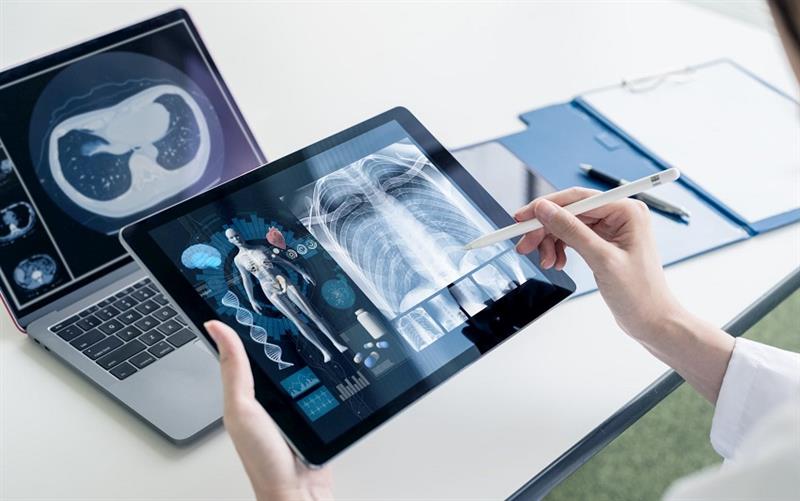
AI-powered medical software is transforming patient-provider interactions and improving system accuracy, efficiency, and patient-centeredness. AI is propelling healthcare into a new era of innovation by improving diagnoses, automating administrative procedures, and increasing patient involvement.
Adopting AI-driven solutions will help hospitals and other healthcare providers increase operational effectiveness while also improving the entire patient experience, which will improve healthcare outcomes for everyone.
The Growing Role of AI in Healthcare
The global healthcare industry has been quick to adopt AI-driven solutions to tackle various challenges, such as workforce shortages, rising costs, and the need for improved patient outcomes. AI-powered software is now assisting in scheduling, diagnostics, personalized treatment plans, and even virtual consultations, making healthcare more accessible and efficient.
Let’s explore how AI is revolutionizing staff and patient interactions.
1. Enhancing Administrative Efficiency
One of the most significant pain points in healthcare is the burden of administrative tasks. AI-powered software automates:
Appointment Scheduling: AI chatbots and virtual assistants can handle appointment bookings, rescheduling, and reminders, reducing the workload on front-desk staff.
Medical Documentation: AI-driven transcription services convert doctor-patient conversations into structured medical records, minimizing paperwork and ensuring accuracy.
Billing and Claims Processing: Automated systems identify errors in medical billing, reducing claim denials and ensuring a smoother reimbursement process.
By automating these tasks, healthcare staff can focus more on patient care rather than administrative duties.
2. Personalized Patient Engagement
AI-driven medical software enables personalized interactions with patients, improving their overall experience and adherence to treatments.
AI Chatbots for 24/7 Support: Virtual health assistants can answer patient queries, provide medication reminders, and offer guidance on symptoms, reducing unnecessary hospital visits.
Predictive Analytics for Patient Care: AI analyzes patient history and real-time data to predict health risks, enabling preventive care and early interventions.
Virtual Health Coaching: AI-powered mobile apps provide customized health plans, diet recommendations, and fitness routines based on individual patient profiles.
These advancements foster better communication between patients and healthcare providers, leading to improved patient satisfaction and outcomes.
3. AI in Diagnostics and Decision Support
AI is revolutionizing diagnostics by improving speed and accuracy in detecting diseases.
Medical Imaging Analysis: AI algorithms analyze X-rays, MRIs, and CT scans with high precision, assisting radiologists in identifying anomalies such as tumors or fractures.
AI-Powered Clinical Decision Support Systems (CDSS): These systems provide healthcare professionals with real-time insights, helping them make data-driven treatment decisions.
Early Disease Detection: AI models analyze patient data to detect conditions like cancer, diabetes, and cardiovascular diseases at an early stage, increasing the chances of successful treatment.
With AI’s ability to process vast amounts of data quickly, healthcare providers can make more informed decisions, reducing diagnostic errors and improving patient care.
4. Remote Patient Monitoring and Telemedicine
AI is playing a crucial role in remote healthcare delivery, especially post-pandemic.
Wearable Health Tech: Smart devices monitor vital signs, such as heart rate, blood pressure, and glucose levels, sending real-time alerts to healthcare providers.
AI-Powered Telemedicine Platforms: Virtual consultations powered by AI-driven diagnostics enable doctors to assess patients remotely, improving access to healthcare, especially in rural areas.
Automated Patient Follow-Ups: AI software sends post-treatment follow-up reminders, ensuring patients adhere to their recovery plans.
These innovations make healthcare more proactive, reducing hospital readmissions and improving patient well-being.
5. Improving Staff Productivity and Reducing Burnout
AI-driven automation significantly reduces the workload on medical professionals, helping to combat burnout.
Voice-Assisted Documentation: AI-powered voice recognition tools transcribe doctors’ notes, reducing time spent on paperwork.
AI-Powered Workforce Management: Predictive analytics help hospitals optimize staff scheduling, ensuring proper resource allocation and reducing overtime stress.
Smart Clinical Workflows: AI assists in triaging patients, prioritizing cases based on severity, and streamlining hospital operations.
By reducing repetitive tasks, AI allows healthcare professionals to focus more on patient care, improving job satisfaction and overall efficiency.
6. AI in Mental Health and Behavioral Analysis
AI-powered tools are making mental healthcare more accessible and effective.
AI-Based Mental Health Chatbots: Virtual mental health assistants like Woebot and Wysa provide real-time emotional support and cognitive behavioral therapy (CBT) exercises.
Sentiment and Speech Analysis: AI can analyze a patient’s speech patterns, tone, and text inputs to detect early signs of depression, anxiety, or PTSD.
Personalized Therapy Recommendations: Machine learning models analyze behavioral data to suggest personalized treatment plans and therapy sessions.
With AI-driven mental health solutions, patients receive timely interventions, reducing the stigma and barriers to seeking professional help.
7. AI in Drug Development and Clinical Trials
The pharmaceutical industry is leveraging AI to accelerate drug discovery and improve clinical trial efficiency.
AI-Powered Drug Discovery: AI analyzes massive datasets to identify potential drug candidates, significantly reducing the time and cost of developing new medications.
Virtual Clinical Trials: AI-powered predictive modeling helps identify suitable candidates for clinical trials, optimizing participant selection and reducing dropout rates.
Personalized Medicine Development: AI examines genetic data to customize drug formulations tailored to an individual’s biological makeup.
These advancements are paving the way for faster, more efficient drug development, bringing life-saving treatments to patients sooner.
8. AI-Powered Robotics in Healthcare
AI-driven robotics are revolutionizing both patient care and hospital management.
Surgical Assistance: AI-powered robotic systems, like the da Vinci Surgical System, assist in minimally invasive surgeries with precision and reduced recovery time.
Autonomous Hospital Robots: Robots are being used for disinfection, medication delivery, and patient assistance, reducing the burden on hospital staff.
AI-Enabled Prosthetics: Smart prosthetic limbs use AI algorithms to adapt to a patient’s movements, improving mobility and quality of life.
By integrating AI and robotics, healthcare facilities can enhance efficiency, precision, and patient care standards.